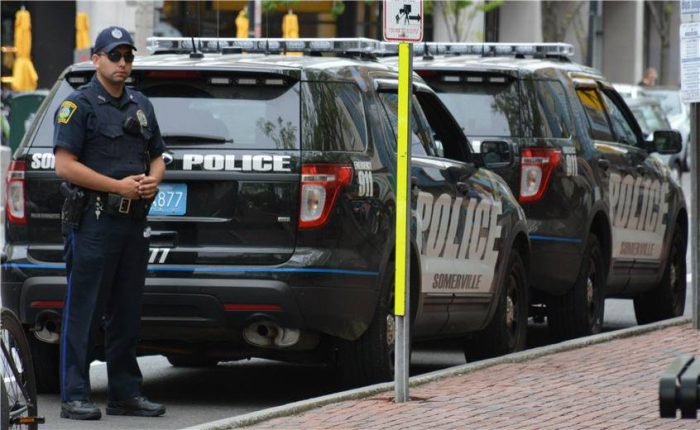An incident prompts scrutiny, while councilors struggle with the fairness of the hiring system.
(Somerville Wire) – Five councilors on the Confirmation of Appointments and Personnel Matters committee interviewed three candidates for the police reserve list in Somerville, on February 2. The three were hoping to fill vacancies in the Somerville Police Department. Matthew Fairchild did not make the list, in a unanimous vote, while Giovanna Lorenzet Marin and Jose DaCosta were approved in a 3-2 vote. Over the course of the meeting, officials raised concerns with the hiring process itself, while a potential question of dishonesty also became a priority.
Both Councilor J.T. Scott and Councilor at Large Will Mbah voted against all three applicants, for reasons that they elaborated on in conversation with the Somerville Wire. Mbah said that he could not in good conscience vote in favor of any candidate, stating that healing from national trauma took precedent. Scott explained that he found challenges within the appointment process and could not say for certain that an “injustice” was not happening there. In particular, a candidate had said in anonymous interviews that he or she had a criminal record, but when questioned before the councilors on February 2, none of the candidates openly admitted the fact. This led Scott to believe that one of them had lied.
“This evening’s conversation raises another concern for me,” said Scott, during the meeting. “That concern is that we have public documents that are a part of the civil service record that indicate that an answer was given by a candidate, and we know it was one of the candidates before us this evening.” He added, “When asked questions this evening, none of the candidates’ responses reflected what is in the sworn record of civil service testimony that is documented in this decision.”
According to Mbah, having a criminal record does not automatically disqualify a person from being appointed to the Somerville Police Department; however, the problem of a candidate not being sincere about this history raised alarm. Solicitor Frank Wright said that he understood the statements to be allegations made by the appellant and not facts put forth before the City, and chair Mary Jo Rossetti said that she was in agreement with him. Scott replied that the presence of a criminal record, while not disqualifying, is not hearsay but truth. He cited the case of O’Donnell vs. the City of Somerville as an instance where a candidate was truthful about a criminal record, where the panel involved was looking to hire people who have “grown and learned from their mistakes in the past.”
Both Mbah and Scott expressed concerns about the hiring process. Most of Massachusetts uses the civil service system to appoint police and fire personnel. Cities that use a standard civil service list to hire generate this roster based off of exam scores, with the tests being administered every two years. When using the list, the city would have to demonstrate proof of the number of vacancies that they have. A new priority hiring list is created every two years, meaning that people must retake the exam in order to remain on it.
Somerville is distinct from the majority of the state in that it elects to utilize a reserve list model, brought into practice in 2008, to hire for police and fire forces. When the City must fill a vacancy, candidates are recommended in order of appointment from a reserve list, before they are interviewed by the City Council. These individuals do not have to retake a test, meaning that they can retain their positions on the list for an indefinite period of time. According to Scott, it is easier for the City to increase their number of vacancies, because they do not have to prove that there is a need for more people to be interviewed. This allows the City to review people who are further down the list and who have lower scores to be considered. This can lead to the possibility of patronage hires, said Scott.
“There has been a constant stream of civil service cases where candidates have alleged favoritism or nepotism in the hiring process that is directly related to the ways in which a reserve list can be manipulated that a standard civil service hiring process cannot,” said Scott. He referenced Lima vs. City of Somerville, a firefighting hiring process case where an extensive reserve list was developed. Henry Lima, a candidate for the force, was bypassed twice for people below him on the list. The person who was hired one of these times was the nephew of Somerville’s Personnel Director William Roche. “That is one way how lower scoring candidates, who are favored for some unknown reason, could be guaranteed a job.”
In December 2019, the City reported 10 patrol officer vacancies, which increased to 16 in January 2020. According to Acting Chief of Police Charles Femino, this shift was made “to account for expected attrition and still maintain sufficient reserves to fill vacancies.” After interviewing all candidates, the hiring panel recommended nine candidates to the reserve list. He added that the reserve list is used to help streamline the hiring process.
“Police vacancies create risk to both public safety and officer safety,” wrote Femino, in an email. “The purpose of a reserve list is to significantly decrease the time required for the hiring and onboarding of new officers (generally this reduces the process by at least six months). By maintaining an active list of reserve candidates, vacancies can be filled more quickly as they arise.”
Mbah said that one of his chief concerns in reforming the police force is that he is hoping to see greater diversity, adding that the culture of hierarchy and subjugation is problematic. He added that the City is currently involved in looking for a director of racial and social justice, someone who would work to eliminate institutional and structural racism and address social inequalities.
“This individual is somebody I’m hoping will be able to lead us through new hires of policing, reimagining policing,” said Mbah. “We’re not going to solve it overnight. It’s a complex topic in a society that is built on racial policies—you have to dismantle the whole system. Fundamentally, police should be accountable to any community that they’re serving.”








